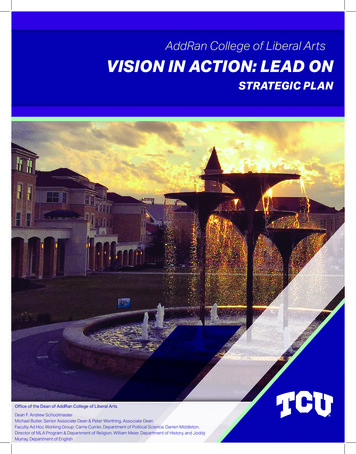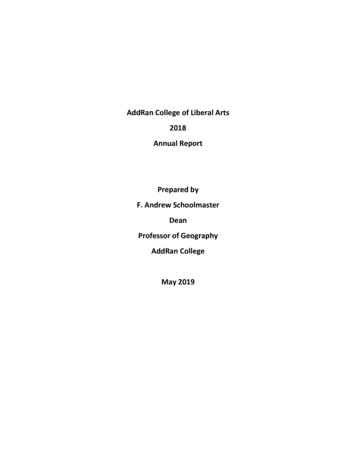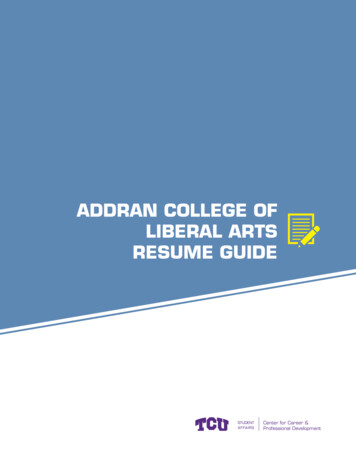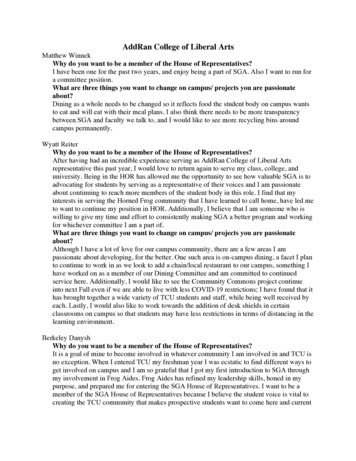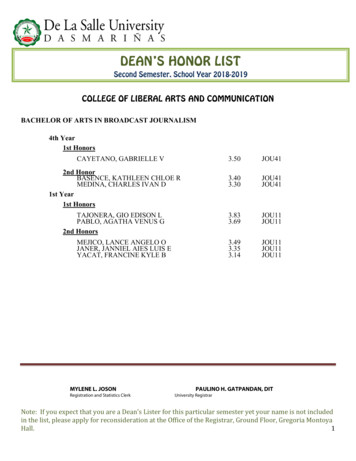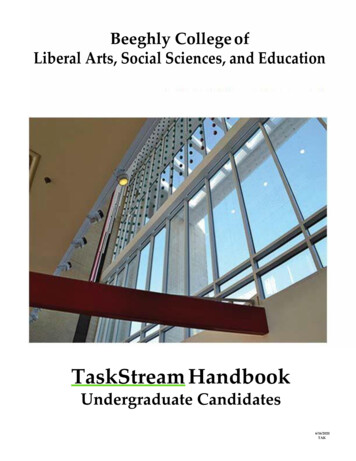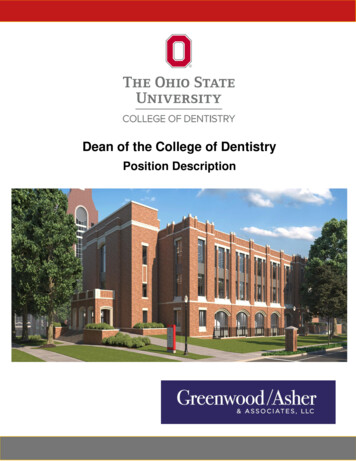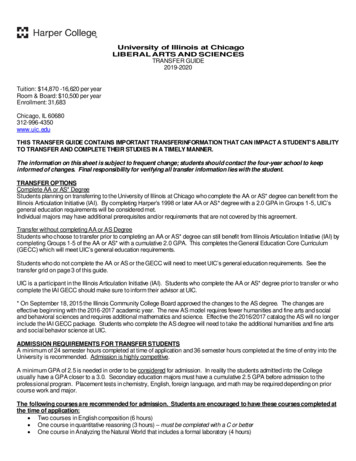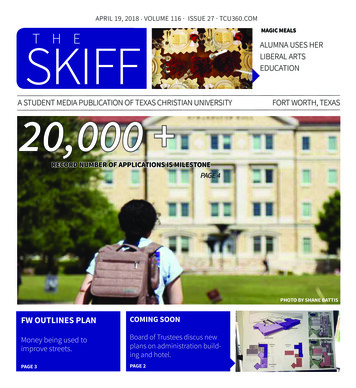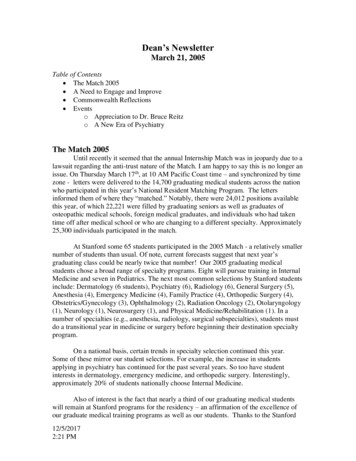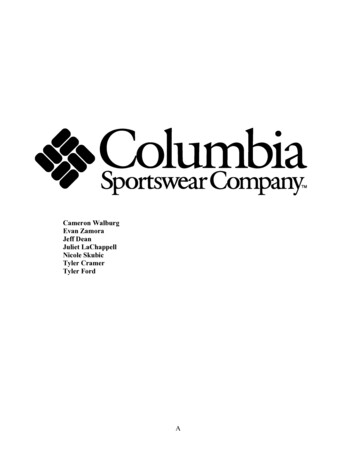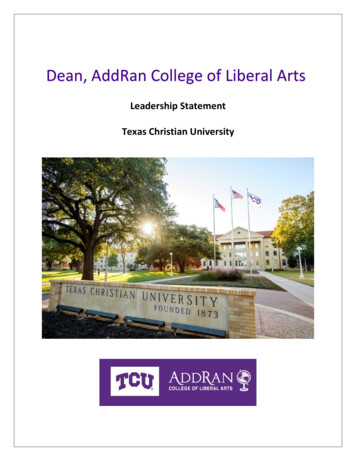
Transcription
Dean, AddRan College of Liberal ArtsLeadership StatementTexas Christian University
THE OPPORTUNITYTexas Christian University’s AddRan College of Liberal Arts seeks a new dean to lead theschool’s future evolution and growth.Addison and Randolph Clark, founders of Texas Christian Universityand namesakes of the AddRan College of Liberal ArtsABOUT THE ADDRAN COLLEGE OF LIBERAL ARTSMissionTo advance lifelong learning and discovery in the humanities and social sciences and to developcritical thinking, analytical, and communication skills that prepare students for successfulcareers in our global society.VisionTo become a liberal arts college nationally recognized for innovative learning and critical inquirythat enhances our environment, improves the human condition, and develops ethical leaders.The Heart of the UniversityNamed for TCU’s founders, Addison and Randolph Clark, the AddRan College of Liberal Artscreates the bedrock of the university’s intellectual endeavor through the development of coreskills in critical thinking, writing, oral communication, cultural awareness, respecting difference,2
and research and analysis. AddRan provides a multifaceted toolkit that prepares students forlifelong learning and successful careers. The College contributes significantly to the TCU CoreCurriculum: each semester our faculty teach approximately 30 percent of all undergraduatesemester credit hours—more than three other colleges combined.The College is home to the core academicdisciplines of the humanities and social sciences.Composed of 162 full-time faculty members across11 departments, AddRan offers 15 Bachelor of Artsand six Bachelor of Science degrees, a Bachelor ofGeneral Studies, an online master’s degree inCriminal Justice, a Master of Liberal Arts degree,and master’s and Ph.D. degrees in History, English,and Rhetoric and Composition.Units in AddRan College of Liberal ArtsCriminal JusticeEconomicsEnglishGeographyHistoryModern Language StudiesPhilosophyPolitical ScienceReligionSociology & AnthropologySpanish & Hispanic StudiesAddRan College combines an emphasis on theliberal arts traditions of teaching relevant contentwith pedagogical innovation. The College is aleader in interdisciplinary programs on campus andMaster of Liberal Arts programour faculty teach widely in the John V. RoachHonors College and in TCU Study Abroad Programs. Two units of Reserve Officer TrainingAddRan faculty have been instrumental in creating,Corps (Army and Air Force)and continue to forge energetic partnerships with,the Department of Women and Gender Studies(WGST), the Department of Comparative Race and Ethnic Studies (CRES), and the AfricanAmerican and Africana Studies (AAAS) and Latinx Studies (LTNO) minors, all of which arehoused in the School of Interdisciplinary Studies (SIS). AddRan also fosters interdisciplinaritythrough an array of academic minors in:- Asian Studies- British and Postcolonial Studies- Classical Studies- Digital Culture and Data Analytics- Human-Animal Relationships- Middle East Studies- Urban Studies.AddRan College leads the university in promoting a diverse and inclusive campus. Through thestudy of the rich variety of human experiences and societies, our courses equip students with askill set to engage with people from diverse backgrounds and to learn and grow with eachother. For instance, AddRan faculty are spearheading efforts to place Diversity, Equity, andInclusion in the Core Curriculum and have established such campus-wide events as the annualNative American and Indigenous Peoples Day Symposium. The college is also a co-sponsor ofthe nationally-recognized Race, Ethnicity, and Place Conference.3
AddRan College cultivates a dynamic relationship withAddRan Centersthe Fort Worth community with lectures, symposiums,Center for Texas Studiesand internships. Service-learning opportunities facilitateCenter for Digital Expressionstudents’ engagement with local nonprofits such asCenter for Urban StudiesRefugee Services of North Texas and the Tarrant AreaCenter for Languages & CulturesFood Bank. Numerous academic centers housed inAddRan also build bridges to community partners suchas the Fort Worth Public Library and the City of Fort Worth.AddRan College hosts popular town-and-gown events such as Back-to-Class night, the Robert D.Alexander Lecture in the Liberal Arts, and the annual Distinguished Faculty Lecture Series. Webring together local residents with faculty, staff, and students to address such topical issues as:- the role of religion in public life through the Daryl Schmidt Lecture;- what it means to be human via the Ronald E. Moore Humanities Symposium;- the costs of war at the annual LCpl. Benjamin W. Schmidt Symposium on War, Conflict,and Society;- salient ethical issues in the Florsheim Lecture in Ethics;- and contemporary political issues at the Jim Wright Symposium.Through our commitment to scholarship, teaching, service, and community outreach, AddRanCollege truly is the beating heart of Texas Christian University.AddRan studentsApproximately 1,300 undergraduate students major in our liberal arts programs each year,along with 250 liberal arts graduate students. AddRan students have demonstrated theirexcellence in many capacities. They have earned Fulbright Scholarships, a Scoville Fellowship,fellowships to Princeton in Africa and Asia, and a Rhodes Scholarship. Additionally, bothgraduate and undergraduate students have had their work published as journal articles, bookchapters, book reviews, and encyclopedia entries and presented research at numerousprofessional conferences. Students showcase their achievements at the annual AddRan Festivalof Undergraduate Scholarship and Creativity.AddRan facultyAddRan College measures its academic strength by the quality of its academic programs, facultyresearch and creative activity, and the success students derive from our collective belief in, andpractice of, the Teacher-Scholar model. AddRan faculty, which include thirteen endowed chairsand professorships, have published 43 books, 259 refereed articles, and 119 book chapters inthe last three years. AddRan faculty have also been successful in securing funding from federalagencies such as the National Endowment for the Humanities, the Natural Science Foundation,the Ford Foundation, USAID, and the Department of Justice. We bring this scholarly expertiseinto the classroom where our courses provide an intellectual foundation for TCU students in allareas of study.4
Scharbauer Hall, office of the Dean of the AddRan College of Liberal ArtsQUALIFICATIONS Required Earned doctorate in an appropriate academic discipline;A distinguished record of achievement as a scholar and teacher worthy of therank of full professor in a liberal arts department at TCU;Successful experience as an academic leader, such as Department Chair,Associate Dean, Dean, or Program Director;Experience or potential for extensive fundraising.Preferred Proven advocate for the liberal arts, both inside and outside the academy; Demonstrable track record of leadership and engagement in DEI; Strong record of teaching and leadership in undergraduate and graduateeducation; Ability to work with undergraduate and graduate programs in a variety ofdisciplines within the liberal arts; Experience working collaboratively across academic affairs, student affairs, andsupport services; Strong communication, consensus-building, and interpersonal skills; Knowledge of current curricular and programmatic trends in liberal artseducation.5
KEY RESPONSIBILITIES Report directly to the Provost and operate in an environment where governance isshared, openly and unambiguously, between faculty and administration;Work effectively with the Provost, Vice Provost, Deans, Associate Deans, DepartmentChairs, faculty, and staff to advance the University’s strategic plan and its commitment toinclusive excellence;Achieve successful philanthropic support for the College by working closely with universityadvancement and development personnel;Establish and maintain key relationships with the College Board of Visitors, alumni,student groups, community leaders, and other significant stakeholders;Implement effective policies to attract, retain, and support diverse and excellentundergraduate and graduate students in all programs;Implement effective policies to attract, retain, and support diverse and excellent faculty inall departments;Support faculty and students in identifying, securing, and reporting internal and externalfunding for scholarship and its equivalents;Support faculty and students working in and across departments and programs, withinAddRan College and across the University;Envision and implement plans to deepen the University’s commitment to the Liberal Artsas the central component of the core curriculum and the intellectual heart of theuniversity;Develop the College of Liberal Arts budget, ensure efficient management of resources,and coordinate student financial aid.THE PROVOSTTeresa Abi-Nader DahlbergIn March 2019, Teresa Abi-Nader Dahlberg was named TCU’s Provost and Vice Chancellor forAcademic Affairs (TCU Provost). Dr. Dahlberg joins TCU at a time of great momentum andaspiration for our faculty, staff, and students. Recent investments in academics, such as thelaunch of a School of Medicine in conjunction with the University of North Texas Health ScienceCenter, as well as over 1 billion in capital improvements, including new labs and academicfacilities, enable TCU’s continued success.Dr. Dahlberg views higher education as a transformative experience. She brings a wealth ofknowledge in interdisciplinary scholarship, high-impact teaching practices, and inclusiveexcellence. To learn more about Dr. Dahlberg, see her recent profile in TCU Magazine.Profile: Dr. Dahlberg6
Dr. Dahlberg earned a bachelor’s degree from the University of Pittsburgh and Master’s andDoctoral degrees from North Carolina State University. She has been recognized as Woman ofthe Year by the University of North Carolina at Charlotte (2005), Diversity in Business Catalystby the Charlotte Business Journal (2006), Woman of Distinction for STEM Education by the GirlScouts Hornets’ Nest Council (2012), and was inducted into the electrical and computerengineering Alumni Hall of Fame by N.C. State University (2017).At TCU, she holds the rank of professor in Engineering and in Computer Science. Before hertime at TCU, Dr. Dahlberg held positions as dean, chief academic officer, associate dean, andcenter director at Syracuse University, The Cooper Union for the Advancement of Art andScience, and UNC Charlotte. Dr. Dahlberg founded the STARS Computing Corps, a NationalScience Foundation alliance for broadening participation through service-learning. She inspiredthe Prospect for Success campus-wide freshman experience at UNC Charlotte and launched theOffice for Inclusive Excellence while at Syracuse.The Provost’s senior administrative team is comprised of school and college deans, in additionto experienced leaders focused on enrollment management, research, and graduate studies.The positive interplay of long tenured leadership and new perspectives brought by recentlywelcomed colleagues helps to foster innovation and collaboration in academic affairs.Vision in Action: Lead OnHigher education is experiencing dynamic change, and TCU is eagerly preparing for a future ofcontinued growth and academic excellence. Now more than ever, there are excitingopportunities to engage, educate, and support students, while we continue to strengthen TCU’sposition as a leading university.The university’s strategic plan, Vision in Action: Lead On focuses on four key areas:1.2.3.4.Strengthen the academic profile and reputationStrengthen the endowmentStrengthen the TCU experience and campus cultureStrengthen the workforce (both employees and graduates).The plan was recently approved and is generating smart initiatives and thoughtful planningthroughout the TCU community. Among Dr. Dahlberg’s first actions was to convene academicaffairs leaders and establish a vision for how the strategic plan would inform aligned actionsand strategies.Academic priorities (Academic Affairs Priorities) include the launch of the TCU and UNTHSCSchool of Medicine that uses the distinctive Compassionate Care curriculum to train physiciansas empathetic scholars (TCU and UNTHSC School of Medicine). The university is defined by itscommitment to the teacher-scholar model, to fostering ethical leaders and creating globalcitizens, as well as its commitment to the Mission, Vision, and Values of the university. Curricula7
are grounded in TCU’s strong liberal arts tradition and strengthened by our focus on generatinglifelong learners. Diversity, equity, and inclusion are prioritized and help define a forward pathfor our Horned Frog community.Frog Fountain, originally built in 1969, features four lotus leavesthat symbolize the passing of knowledge from one class to the next.ABOUT TCUFounded in 1873, Texas Christian University sits on 299 acres nestled in a primarily residentialpart of Fort Worth, just minutes away from downtown. TCU began as a family endeavor whenbrothers Addison and Randolph Clark, Fort Worth based ministers and teachers, brought to lifetheir vision of offering a classical education rooted in values and character. They succeeded increating an enriching community where men and women could acquire a liberal arts educationand strive to serve the greater good.Nearly 150 years later, we are still that place.Today, through strategic planning, vision, and generosity, we have created a campus thathonors our history as we look to the future. Even as the world changes dramatically, TCUremains a thriving and purposeful academic community where students are supported in theirquest for education, inspiration, and success.Our students8
TCU continues to attract some of the nation’s most outstanding student talent to Fort Worth.For the 2019 first-year class, the University received 19,028 applications, making TCU one of themost selective schools in the state of Texas. Currently, TCU enrolls 9,474 undergraduates and1,490 graduate students. The University has benefitted from significant enrollment growth,with first-year student enrollment increasing from 1,630 freshmen in 2008 to 2,159 first-yearstudents in 2019 while maintaining a favorable student-faculty ratio. Twenty-six percent ofstudents self-identify as a member of a minority group, five percent are international students,and forty-two percent are from out-of-state.Each year, TCU offers hundreds of needs-based and merit scholarships in an effort to ensurethat bright and deserving students gain access to a TCU education. We are committed togrowing the financial aid budget, as we also develop the people and programs that TCU offers.TCU’s financial aid budget will exceed 25 percent of the University’s overall operating budgetthis year.Campus life and cultureThe TCU campus is not only beautiful, with its manicured, tree-lined walkways and welcomingcommon spaces, but many say that it immediately “feels like home.” TCU offers a seamlessblend of the traditional and modern, weaving modern academic spaces with performing artsvenues and athletics facilities and stadiums. You’ll walk through stately columned grounds thatgive way to sleek, modern technology-first spaces that invite collaboration and interaction.The sense of community is unparalleled; fifty-three percent of the undergraduate student bodylives on campus—a percentage that has increased each of the past five years as a result of theUniversity’s commitment to residential living. The University includes eight schools andcolleges, in addition to the John V. Roach Honors College and the new School of Medicine,which is operated in collaboration with the University of North Texas Health Science Center inFort Worth.Our students are supported by more than 2,200 faculty and staff. The University hasapproximately 700 full-time faculty members, 86 percent of whom hold a terminal degree. Fornine consecutive years, TCU has been selected as one of the Great Colleges to Work For .At TCU, diversity, equity and inclusion are an educational imperative that is tied directly to ourUniversity mission and vision. For the second consecutive year, TCU has earned the HigherEducation Excellence in Diversity Award, which highlights our ongoing commitment to build acomprehensive DEI strategy that aligns with our core values and to create a campus culturewhere everyone is respected and feels included. Among TCU’s actions this year was approving aresolution to adopt DEI into its core curriculum.The candidate selected for this position will work with a variety of students, faculty, and stafffrom across the campus. The colleague we are seeking should embrace the longstanding9
emphasis on community-oriented ethical teaching and learning arising from TCU’s heritagealong with its progressive history as, for instance, the first post-secondary institution in Texas toembrace co-education.For a recent faculty explanation of the “C” in Texas Christian University, we invite you to readan essay by Drs. Darren J.N. Middleton and Elizabeth H. Flowers, available here:Faculty Feature: The "C" in TCU.OperationsTCU’s endowment value was 1.6 billion at the end of 2018, and the fiscal year 2020 operatingbudget is approximately 777 million. The University’s healthy financial condition has enabled itto significantly increase new scholarships and other financial aid, endowed chairs andprofessorships, support new programs and academic initiatives, as well as invest in thedevelopment of residential and academic buildings.In April 2019, the TCU Board of Trustees and administration approved a comprehensivefundraising campaign with a goal of 1 billion. The primary focus of this campaign will be tosecure significant support for people and programs and to increase TCU’s endowment. Buildingthe endowment is key to the continued growth and success of the University.ABOUT FORT WORTH AND THE DFW METROPLEXLike TCU, Fort Worth has the approachable, friendly charm of a smaller town, but offers theamenities, cultural activities, diversity, and unique personality of a much larger city. Fort Worth,Texas is the 13th largest city in the United States with an ever-growing population nearing 1million. Fort Worth and TCU have grown together in a beautiful century-long relationship. You’llfind that many Horned Frogs put down roots here after graduation, thanks the region’s thrivingjob market.Fort Worth is part of the Dallas-Fort Worth (DFW) metropolitan area, the fourth largestmetropolitan area in the United States, and the number 1 tourist destination in Texas. In 2018,bizjournals.com ranked Fort Worth the 7th most affordable city to live and work in the UnitedStates and U.S. News and World Report named Fort Worth one of the Best Places to Live. FortWorth, Dallas, and Arlington all rank among the top 25 most diverse cities in the country. FortWorth also ranked highly in the Human Rights Campaign’s Municipal Equality Index, whichmeasures cities’ inclusion of lesbian, gay, bisexual, and transgender residents.Fort Worth is known for its vast array of cultural, educational, and entertainment opportunities.The city boasts three world class art museums—the Kimbell Art Museum (architects Louis I.Kahn and Renzo Piano), the Modern Art Museum of Fort Worth (architect Tadao Ando), and theAmon Carter Museum of American Art (architect Philip Johnson). The Bass Performance Hall isone of the premier performance venues in the country, home to world-class touring10
productions; resident dance, music, and opera companies; and performances by TCU studentsand faculty. Concerts, film festivals, and other events are held regularly at Sundance Square,Panther Island, and Near Southside venues.Outdoor recreation opportunities abound, taking advantage of the nearly year-round goodweather. Along the river are ove
To become a liberal arts college nationally recognized for innovative learning and critical inquiry that enhances our environment, improves the human condition, and develops ethical leaders. The Heart of the University . Named for TCU’s founders, Addison and Randolph C
